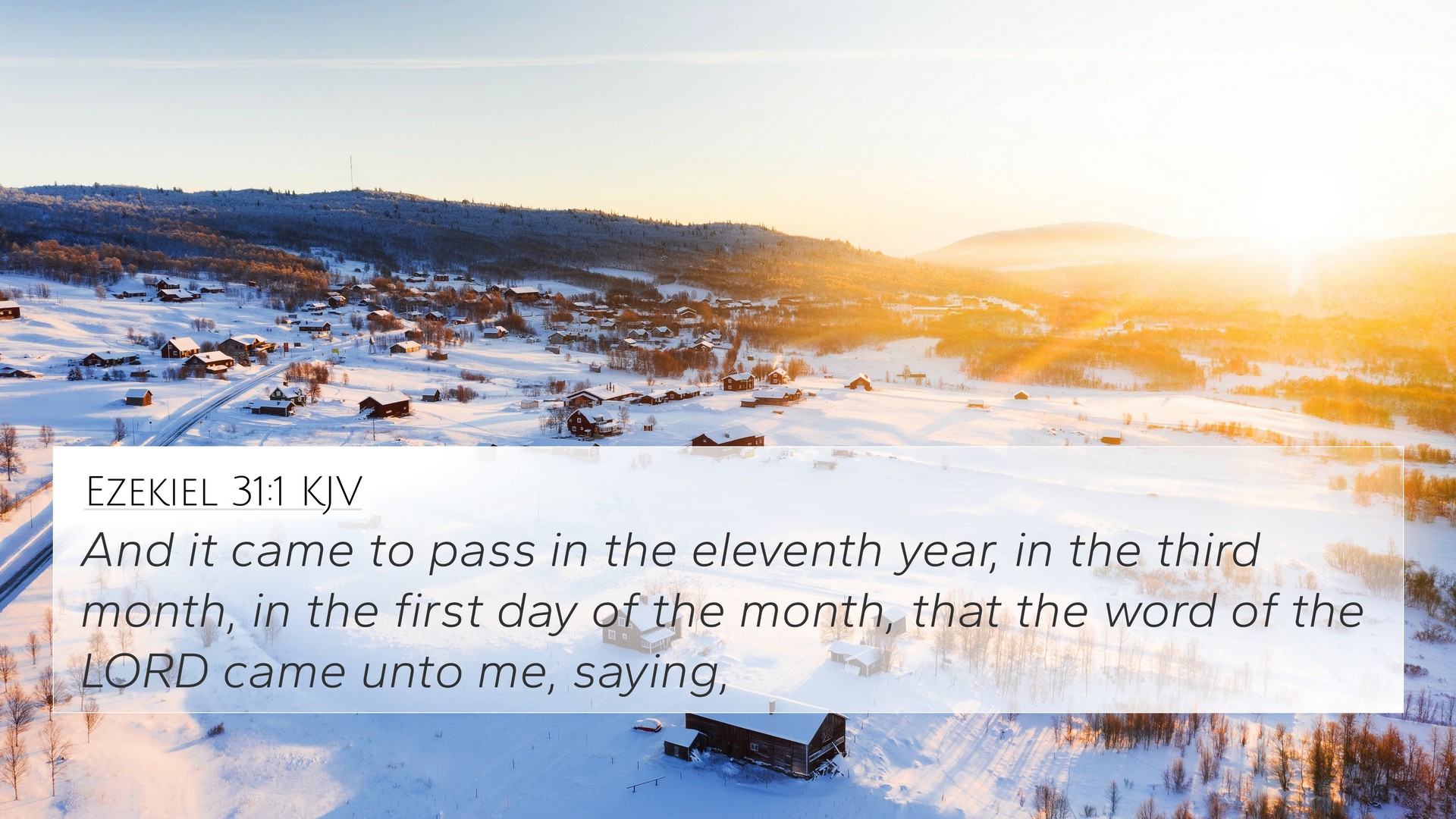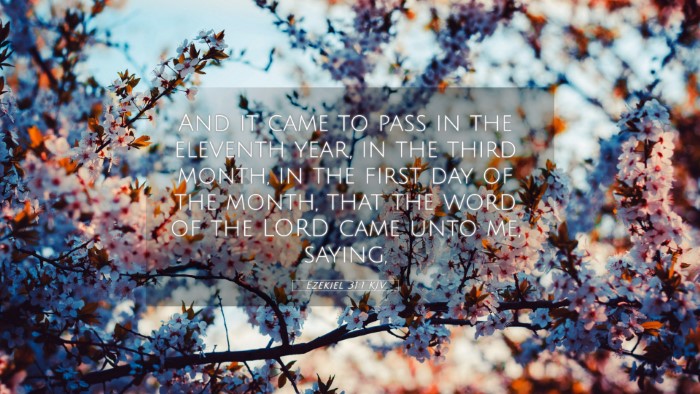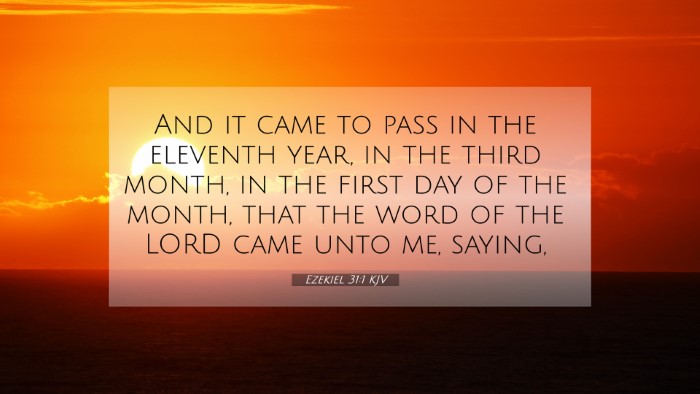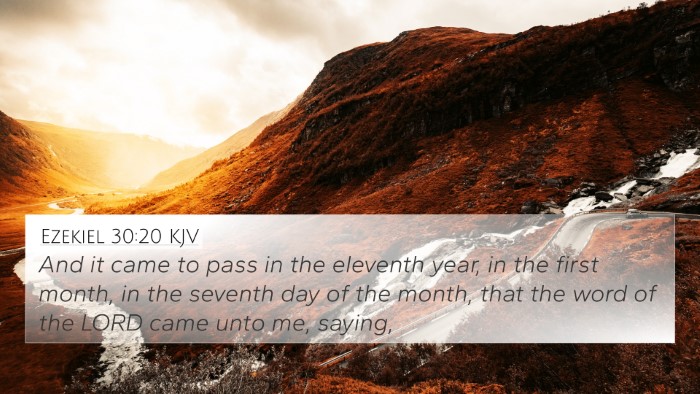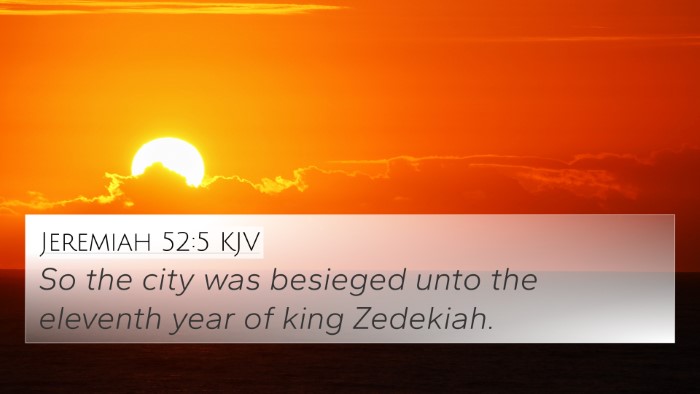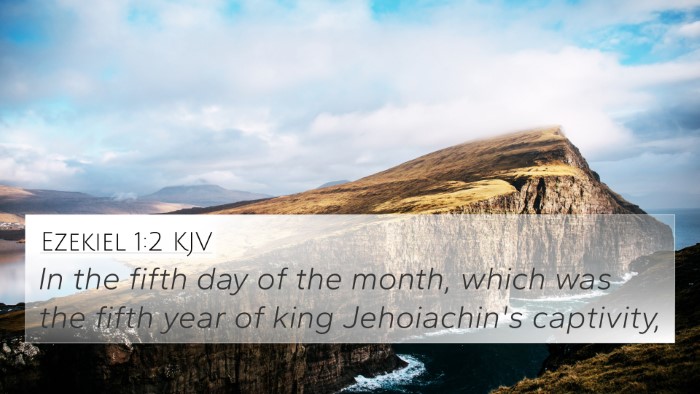Ezekiel 31:1 - Summary and Interpretation
Ezekiel 31:1 states: "And it came to pass in the eleventh year, in the third month, in the first day of the month, that the word of the Lord came unto me, saying," This verse marks the beginning of one of the significant discourses in Ezekiel, wherein God communicates a profound message to the prophet.
Contextual Background
Ezekiel was a prophet during the Babylonian exile, where he delivered God’s messages to the Israelites regarding their sin, judgment, and eventual restoration. This verse sets the stage for a prophetic vision concerning Egypt and its symbolic representation as a great cedar tree, intended to convey God's sovereignty over nations.
Interpretative Insights
Insights drawn from public domain commentaries highlight several important facets of Ezekiel 31:1:
- Chronological Context: Matthew Henry notes that the specific dating in this verse emphasizes the precision of prophetic revelation, marking significant moments that are anchored in real history.
- Divine Revelation: Albert Barnes points out that the phrase "the word of the Lord came unto me" signifies the authoritative and divine nature of the message Ezekiel is about to receive.
- Symbolism of Trees: Adam Clarke emphasizes that the cedar tree, which will be discussed in subsequent verses, serves as a symbol of earthly kingdoms and their pride, drawing a parallel with how nations are viewed in divine judgment.
Connections with Other Bible Verses
This verse can also be related to several other passages, showcasing the connections between biblical texts:
- Isaiah 2:13: "And upon all the cedars of Lebanon, that are high and lifted up, and upon all the oaks of Bashan." This verse shares thematic similarities regarding the grandeur and eventual downfall of great nations or trees.
- Jeremiah 22:23: "O habitation of the valley, rock of the plain, thou that sayest, Who shall come down against us? or who shall enter into our habitations?" This reveals God's judgment on pride and complacency, akin to the themes in Ezekiel 31:1.
- Ezekiel 17:23: "In the mountain of the height of Israel will I plant it." This directly links to the imagery of planting and growth, crucial in understanding God's providence and authority over nations.
- Psalm 92:12: "The righteous shall flourish like the palm tree: he shall grow like a cedar in Lebanon." A direct contrast is shown here between the righteous and the prideful, further emphasizing the significance of God's sovereignty.
- Revelation 18:2: "And he cried mightily with a strong voice, saying, Babylon the great is fallen, is fallen." This casts light on the eventual fall of powerful nations as foretold in Ezekiel.
- Daniel 4:10-12: "I saw a tree in the midst of the earth, and the height thereof was great." This passage also elaborates on a great tree that symbolizes a kingdom, drawing parallels with Ezekiel’s imagery.
- Matthew 3:10: "And now also the axe is laid unto the root of the trees: therefore every tree which bringeth not forth good fruit is hewn down, and cast into the fire." This calls attention to the outcome of pride and the absence of fruitfulness in a spiritual context.
- Luke 16:15: "For that which is highly esteemed among men is abomination in the sight of God." This verse reinforces the message that earthly grandeur does not coincide with God's values.
- Proverbs 11:28: "He that trusteth in his riches shall fall: but the righteous shall flourish as a branch." This is a salient reminder that reliance on earthly pride often leads to downfall.
Thematic Considerations
The major themes developed in Ezekiel 31:1 include:
- The Sovereignty of God: The emphasizing of divine revelation underlines God’s ultimate authority over all nations.
- Pride and Downfall: The imagery of the cedar hints at the arrogance and impending judgment that will come upon those who exalt themselves.
- Historical Context: The precise dating offers the context of the message, underscoring its significance in the prophetic timeline.
Conclusion
In Ezekiel 31:1, we encounter a profound glimpse into God's dealings with nations through the significant metaphor of a cedar tree. It serves as a reminder of divine authority, the futility of pride, and the historical weight of prophetic proclamations. As we explore the layers of meaning within this verse, it invites us to engage in profound Biblical studies through cross-referencing, drawing thematic connections, and embarking on a comparative analysis of Biblical texts.
Bible Study Tools
For deeper exploration of these themes and connections, consider utilizing:
- Bible concordance tools to identify cross-references and parallel verses.
- Bible cross-reference guides to explore thematic relationships between texts.
- Comprehensive Bible cross-reference materials for a detailed understanding of scriptural interconnections.
- Discussions on how to effectively use scripture cross-references in personalized Bible studies.
